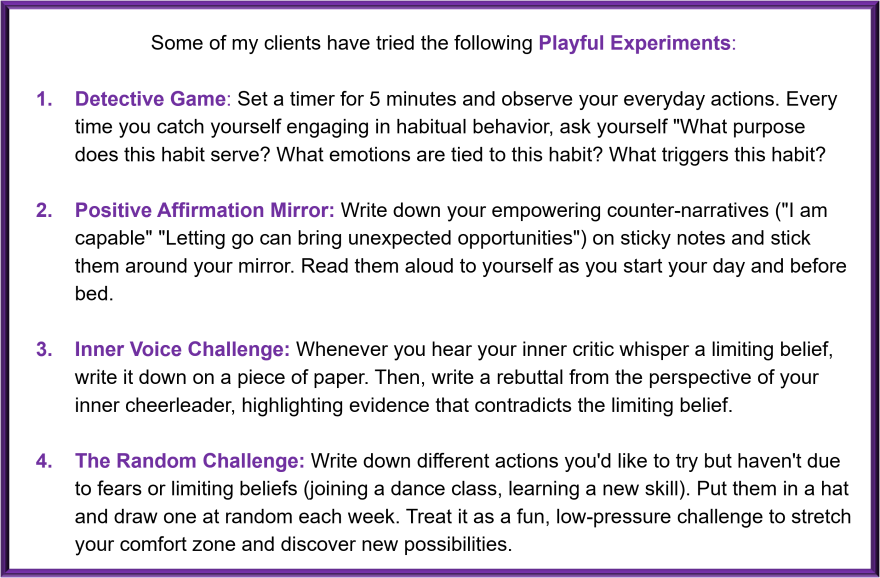|
We grapple with patterns that hold us back: procrastination, disorganization, or difficulty focusing. But what if there was a way to change our relationship with these challenges instead of just changing our behavior? Imagine ditching the pressure and guilt of "new year, new me" and instead reframing these habits.

Liminal thinking invites us to rewrite the narrative of our habits. Instead of battling procrastination head-on by seeking to directly change our behavior, we explore the beliefs that fuel it. We then test new possibilities and rewrite our mental narratives. Yes, it’s like combining coaching, curiosity, neuroplasticity, self-compassion, and more!
This model requires three essential practices:
1. Cultivate Curiosity & Self-Compassion:
- Replace judgment with a curious interest in your habits. Ask yourself: "What purpose does this habit serve? What emotions are tied to this habit? What triggers this habit?
-
Treat yourself with kindness. Forgive yourself for stumbles and setbacks. Habit change is a journey, not a sprint. There will be detours and occasional backtracks. Accept them as part of the learning process.
2. Rewire Hidden Beliefs:
- Identify the beliefs fueling your unwanted habits. They sound like "I'm not good enough" or "Things will fall apart if I don't control them."
-
Challenge these narratives with evidence and counter-narratives that empower you. Can you find examples of your competence? Can you practice letting go of control and see what happens?
3. Embrace an Experimental Mentality:
- Turn change into a game, not a battle. Design playful experiments to test new behaviors and beliefs.
- Celebrate progress, even small wins. Each experiment, regardless of the outcome, offers valuable learning opportunities. Notice and appreciate every small step forward.

Here are some additional ideas on reframing habits:
- Imagine a future where this habit no longer impacts you. What does that look and feel like?
- Track your experiments (you can use the ones in the box) and reflect on your learnings. This process builds self-awareness and fuels progress.
- Reframe the habit. Instead of viewing the habit as a negative behavior to break, emphasize it as a skill to develop or a chance to achieve a desired outcome.
- Experiment with evidence-based techniques for habit replacement such as: habit loops, habit stacking, and mindfulness practices. These techniques can help create new, desirable habits and weaken the hold of unhelpful ones.

- Build a supportive environment conducive to positive change. Schedule time for habit practice, identify a support system, and develop coping mechanisms for setbacks. Partner with friends, family, or your coach to establish clear goals and measurable progress markers. The process will reinforce positive behaviors, bolstering motivation and staying on track.
- Don't be afraid to fail. Experimentation means testing, tweaking, and sometimes falling face-first into a learning opportunity. See setbacks as data points, not failures, and adjust your approach with the new knowledge.
Remember, it's not about willpower or brute force, but curiosity, compassion, and a willingness to experiment.
What’s the next step? Choose one habit tugging at you, and design a playful experiment to explore its roots. Track your progress, celebrate your wins, and remember, there are no failures, only data points in your journey.
Happy 2024!
With gratitude,
Ana Isabel Sánchez
   
|